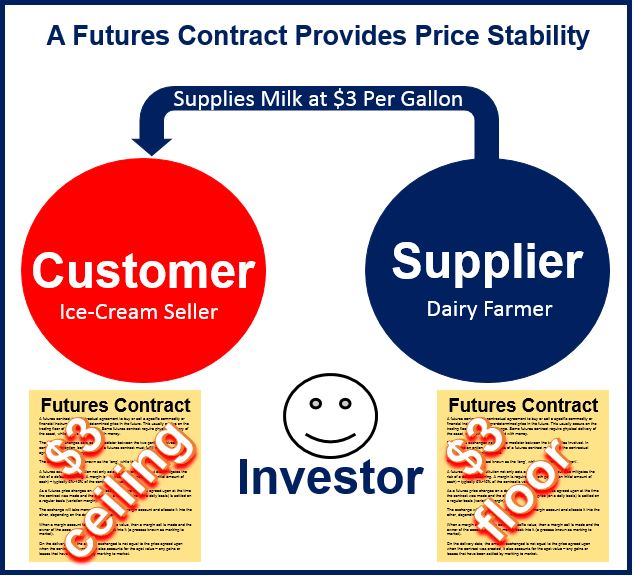A futures contract is a contractual agreement to buy or sell a specific commodity or financial instrument at a pre-determined price in the future. This usually occurs on the trading floor of a futures exchange. Some futures contracts require physical delivery of the asset. In other contracts, on the other hand, the parties settle with money.
Buyers and suppliers opt for a futures contract because they seek price stability.
The futures exchange or futures market acts as the mediator between the two parties involved. In contrast to an option, both parties of a futures contract must fulfill the contractual agreement on the delivery date.
Futures contract – long and short
The buyer of the contract known as the ‘long,’ while the seller is the ‘short.’

According to nasdaq.com, a futures contract is:
“A legally binding agreement to buy or sell a commodity or financial instrument in a designated future month at a price agreed upon at the initiation of the contract by the buyer and seller.”
Futures contract margins
A futures exchange institution not only acts as an intermediary but also mitigates the risk of a default occurring. Both parties require a margin, i.e., an initial amount of cash. This is typically 5%-15% of the contract’s value.
As a futures price changes on a daily basis, the price that was agreed upon at the time the contract was made and the change in a futures price (on a daily basis) is settled on a regular basis (variation margin).
The exchange will take money out of one party’s margin account and allocate it into the other, depending on the daily profit or loss.
When a margin account falls below a specific value, then a margin call is made and, the owner of the account must add money back into it (a process known as marking to market).
On delivery, the amount the traders exchange is not the same as the price they agreed when creating the contract. It also accounts for the spot value, i.e., any gains or losses that traders settled by marking to market.
Definition of a futures contract, according to Björk:
There is a quoted price F(t,T) – the futures price at time t for delivery of J at time T.
During any time interval [t,s] , the holder receives the amount F(s,T) – F(t,T).
At T, the holder pays F(T,T) and receives J.
There are hundreds of futures and futures options exchanges worldwide trading, including: CME Group, IntercontinentalExchange (ICE Futures Europe), NYSE Euronext, EURIBOR, FTSE 100, CAC 40, AEX index, SAFEX, Sydney Futures Exchange, Tokyo Stock Exchange TSE, Tokyo Commodity Exchange TOCOM, Tokyo Financial Exchange, the London Metal Exchange, and the New York Mercantile Exchange CME Group.
